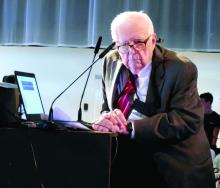ROME – Patients who have undergone coronary artery bypass surgery and who later have an acute coronary syndrome event gain the most from an aggressive lipid-lowering regimen, according to an exploratory analysis of data from more than 18,000 patients enrolled in the IMPROVE-IT trial that tested the incremental benefit from ezetimibe treatment when added to a statin.
Additional exploratory analyses further showed that high-risk acute coronary syndrome (ACS) patients without a history of coronary artery bypass grafting (CABG) also benefited from adding ezetimibe to a background regimen of simvastatin, but the benefit from adding ezetimibe completely disappeared in low-risk ACS patients, Alon Eisen, MD, said at the annual congress of the European Society of Cardiology.
His new analysis of results from the IMPROVE-IT (Improved Reduction of Outcomes: Vytorin Efficacy International Trial) study showed that the 10% of patients with a history of CABG prior to the ACS event that got them into the trial had a 9-percentage-point reduction in the incidence of the trial’s primary efficacy endpoint during an average 7 years of follow-up, compared with a 1–percentage point reduction among the other 90% of patients. This translated into a number needed to treat of 11 patients with a history of CABG and a recent ACS event to prevent one cardiovascular disease event over the next 7 years, compared with a number needed to treat of 77 among everyone else in IMPROVE-IT. Coincident with his report at the congress, the results appeared in an article published online (Eur Heart J. 2016 Aug 28. doi: 10.1093/eurheartj/ehw377).‘The benefit of adding ezetimibe to a statin was enhanced in patients with prior CABG and in other high-risk patients with no prior CABG, supporting the use of more intensive lipid-lowering therapy in these high-risk patients,” said Dr. Eisen, a cardiologist at Brigham and Women’s Hospital in Boston. He also highlighted that ezetimibe is “a safe drug that is coming off patent.” Adding ezetimibe had a moderate effect on LDL cholesterol levels, cutting them from a median of 70 mg/dL in patients in the placebo arm to a median of 54 mg/dL in the group who received ezetimibe.
These results “show that if we pick the right patients, a very benign drug can have a great benefit,” said Eugene Braunwald, MD, a coinvestigator on the IMPROVE-IT trial and a collaborator with Dr. Eisen on the new analysis. The new findings “emphasize that the higher a patient’s risk, the more effect they get from cholesterol-lowering treatment,” said Dr. Braunwald, professor of medicine at Harvard University and a cardiologist at Brigham and Women’s Hospital, both in Boston.
The finding may help resolve a conundrum that has surrounded the main IMPROVE-IT finding since the results first came out 2 years ago: Although the incremental benefit from adding ezetimibe therapy was statistically significant, its clinical impact was modest, with a number needed to treat of 50 for 7 years to reduce the incidence of the primary endpoint by one event. “From a clinical point of view, the improvement was pretty small,” admitted Dr. Braunwald during a separate talk at the congress. Targeting ezetimibe to post-CABG and other high-risk patients following an ACS event may be a practice that cardiologists are more willing to embrace.The second exploratory analysis reported by Dr. Eisen looked at the more than 16,000 patients in IMPROVE-IT without history of CABG. The analysis applied a newly developed, nine-item formula for stratifying atherothrombotic risk (Circulation. 2016 July 26;134[4];304-13) to divide these patients into low-, intermediate- and high-risk subgroups. Patients in the high-risk subgroup (20% of the IMPROVE-IT subgroup) had a 6–percentage point reduction in their primary endpoint event rate with added ezetimibe treatment, while those at intermediate risk (31%) got a 2–percentage point decrease in endpoint events, and low-risk patients (49%) actually showed a small, less than 1–percentage point increase in endpoint events with added ezetimibe, Dr. Eisen reported.
IMPROVE-IT was funded by MERCK, the company that markets ezetimibe (Zetia). Dr. Eisen had no disclosures. Dr. Braunwald has been a consultant to Merck as well as to Bayer, Daiichi Sankyo, The Medicines Company, Novartis, and Sanofi.
On Twitter @mitchelzoler




